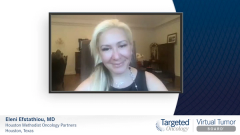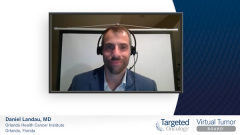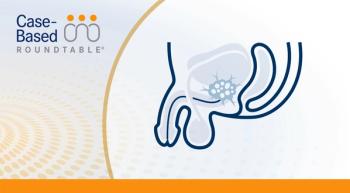
Case 2: A 72-Year-Old Man With Metastatic CSPC
Key opinion leaders review the case of a 72-year-old man with metastatic CSPC and consider optimal treatment approaches in this setting.
Episodes in this series

Transcript:
Alan Bryce, MD: Dr Landau, will you take us through case 2, please?
Daniel Landau, MD: Of course. And Eleni, if I didn’t say it before, tremendous job presenting that first case, great discussion. I’m happy to move on to case No. 2, which is a slightly different setting, metastatic castration-sensitive prostate cancer [mCSPC]. I will say with just my own editorial, I feel like I’m seeing an increased number of these patients recently, whether that has to do with more advanced imaging, or with some previous changes in PSA [prostate-specific antigen] screening. I do feel like the number of patients who are metastatic at the time of diagnosis has gone well up within my clinic. Here, we’re presenting a previously healthy 72-year-old gentleman who has nocturia and intermittent low back pain. During his work-up he’s found to have a PSA of 47.5 [ng/mL]. His bone scan, unfortunately, shows metastatic deposits to 3 bones within the vertebral spine and 2 in the left pelvis. His ECOG [Eastern Cooperative Oncology Group] performance status is excellent, no other comorbidities.
This is a gentleman who is metastatic, high risk, all at presentation, with a relatively high-volume disease with about 5 skeletal metastases. And a decision is made to treat him with docetaxel, ADT [androgen deprivation therapy], and darolutamide. The PSA decreases very nicely to 0.3 [ng/mL]. For some tumor board discussion, I’ll turn this over to Dr Bryce.
Alan Bryce, MD: Dr Efstathiou, let’s start with you. Do you agree with the treatment plan for this patient?
Eleni Efstathiou, MD, PhD: Just for the interest of our audience, it was oligometastatic it looks like, but by conventional imaging. We’ve got 3 bone metastases in the vertebral spine and 2 in the left pelvis. We’re meeting that threshold of 5 right there, and it’s all in the axial skeleton. The question here is, should we be pressing toward combining all 3? I think the jury is still out on the all 3 based on the PEACE-1 study that was presented last year. The ARASENS trial that we just saw was pretty convincing with regard to the efficacy and the safety. But I have to be very honest, in the United States the use of docetaxel has been limited, I believe and correct me if I’m wrong, to less than 5% in the hormone-naive setting. What are we going to do with those data? Personally, I am still struggling with the idea in that borderline low volume disease whether I need to use the docetaxel. Having said that, and because I believe in common sense, I use the ADT plus darolutamide part, I just leave out the docetaxel part when it’s low volume disease. But do I disagree with this in principle? No, I do not. This is something that is absolutely based on what we just saw in the ARASENS trial.
Alan Bryce, MD: What about you, Dr Landau? What’s your treatment paradigm, approaching the question of what do you do in the first line for mHSPC [metastatic hormone-sensitive prostate cancer], mCSPC? And we can fold in that second question, what about a doublet versus triplet? How’s your algorithm work?
Daniel Landau, MD: Absolutely. There are a number of things that we take into account with these patients, one being the exact burden of metastatic disease, how many bones are involved, axial, is there any visceral involvement, which was not noted on this patient? But like we were discussing before on some of these patients, we’ll wind up getting more advanced imaging and maybe find something that’s going to make this an even more aggressive situation. Despite the low uptake of docetaxel in this setting, I have been relatively aggressive with docetaxel in my personal practice. That’s for several reasons, the previous CHAARTED study, ARASENS more recently. For patients like this, given that he did have the 5 bone metastases, but equally significant, was in pretty substantial pain, from the presentation, I favor being more aggressive. I typically do offer triplets for these patients.
Alan Bryce, MD: Fair enough. Maybe I’ll let you finish off the thought with that third question. How do you see the data supporting the use of the various options?
Daniel Landau, MD: What I find relatively interesting is that in a number of studies, ENZAMET for instance, the group that was treated with early docetaxel, it’s not clear that they then get as much benefit from going on to something later, like an enzalutamide. This even goes back to some earlier conversation about being more aggressive early. It appears that perhaps this combination of a triplet with the darolutamide, the docetaxel, and the ADT, might make a difference. Well, granted it is substantial therapy, it might make a difference. Also, interestingly, the adverse event profile appeared very similar between the docetaxel, ADT, placebo group versus the docetaxel, ADT, plus darolutamide group. It didn’t appear that there was significant added toxicity. I feel like all of that data support my increasing use of triplets in this setting.
Alan Bryce, MD: Fair enough.
Eleni Efstathiou, MD, PhD: Alan, can I make a comment here? I completely agree with Daniel on that, but one comment I just thought about. Of course, what I was referring to earlier was that patients usually see first a urologist, and the urologist will tend to not go for docetaxel. But I have a comment for the oncologists who will be listening to this, because you’re saying, there’s a third point you’re making, what data support the use of one versus the other? We’ve got to be very careful. The doublet therapy right now, when we are referring to it, it should not be ADT plus docetaxel alone it looks like, because the comparator in the 2 major trials we just saw was ADT plus docetaxel plus darolutamide or placebo, and ADT plus docetaxel plus abiraterone or placebo. The ADT plus docetaxel is not enough. You have to add that darolutamide, I would say, unless you don’t have access. Then you could go for generic abiraterone, or what have you, especially going back to that safety profile that was pretty impressive. Concerning the question of triplet versus doublet, either you do ADT, docetaxel, darolutamide, or [abiraterone], or you do ADT plus abiraterone, ADT plus [enzalutamide], ADT plus [apalutamide]. And I would say ADT plus [daratumumab]; there’s going to be a trial reporting I hope relatively soon on that matter. It’s not ADT plus [docetaxel] alone. I’d like to hear your thoughts on that too.
Alan Bryce, MD: I think there are a couple of important points. There’s no question that in the United States, the application of these data is going to be affected by referral patterns. Who is treating the patient? Is it the urologist, is it the medical oncologist? Because you’ll see different practice patterns based upon their comfort with the systemic therapy options. But your other point is extremely important, that on the triplet therapy studies, the control arm was always the doublet of docetaxel, ADT. It makes 2 points you made, and one is that basically the docetaxel, ADT doublet probably shouldn’t exist anymore. If you’re going to do docetaxel, you should be planning to do a triplet. You’re going to follow the docetaxel with an oral agent. There’s no reason to stop at just docetaxel, there’s just not.
Then, the second point that we’re not sure of is, well, how much better is the triplet than the doublet with one of the androgen pathway inhibitors? And the answer is we’re not entirely sure, and as you point out, there’ll be some data coming out. But still, we’re not going to have all of the available comparisons of A versus B versus C versus D. We’ve got essentially 5 different regimens to compare now. And of course, the biggest problem we have in this country is that half of patients are still getting ADT monotherapy. That’s never the right answer. I would say at most 5% of patients should only get ADT monotherapy. For me, that’s the patient who is within a year or two of death, they need palliation for painful bone metastases, and they’ve got Parkinson [disease], so I want to minimize their toxicity, [which is] fine. That’s ADT monotherapy. But that’s it.
Transcript edited for clarity.












































